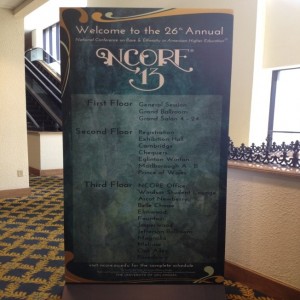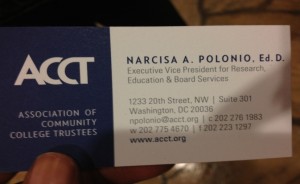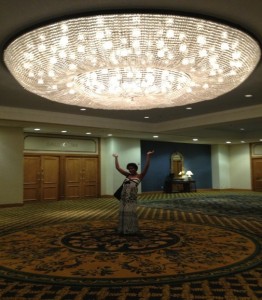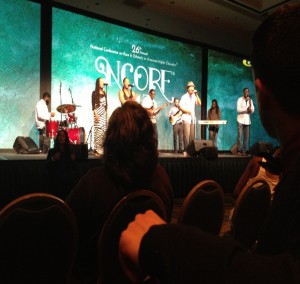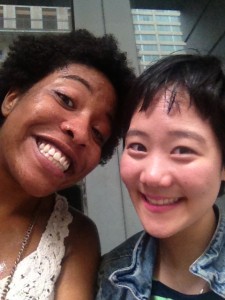By Hye Zo (Ally) Kwun
Never having been to a conference before, I did not know what to expect at all from NCORE. I was excited because I knew that at the very least that I would be surrounded by people who were interested in race and ethnicity issues. I find that at school, when I attempt to engage my friends in discussions about race or culture, many people tend to be apprehensive and try to end the conversation by claiming to be too ignorant on the subject. Thus, I was specifically looking for mentors who were experts in their fields who could give me strong guidance who could help me form my own opinions with stronger conviction. In fact that was exactly what I found at NCORE.
Specifically, when I attended the AAPI Caucus, I met AAPI who were the head of the cultural center at their school and who had years of experience of fighting for equality and change. They imparted advice on me on how to rouse apathetic AAPI to care about discrimination, as well as how to get people to talk.
I attended Asian-American and Pacific Islanders: Championing Change through the Voices of Diverse AAPI Communities as my Pre-Conference Institute. As a Korean-American, I am always interested in what the issue of diversity means to the AAPI community, and how we are perceived in the sphere of POCs. At Notre Dame, I struggled a lot with what I perceived as inaction on the part of the AAPI community. It seemed that all we were doing was putting on shows or giving out dumplings and sushi. There was too much being done in the category of celebrating our culture, but not at all in the office of understanding it. However, this workshop helped me to see that appreciating our culture is a hugely important step for AAPIs because we are still categorized as immigrants. It is important to affirm that we are proud of our culture and that we are not aliens, that we belong in this country as Americans. I think this point could be used as momentum to drive forward to the next step: triggering people to talk about AAPI issues.
I would like to propose to the Asian American Association to hold monthly or biweekly informal meetings that can be a safe place for students (both AAPI and non-AAPI) to explore and discuss anything about the AAPI community. What I gleaned from my pre-conference institute is that the best way to have a stimulated conversation was to have people share stories. An ice-breaker in which people pair off and are allowed two to five minutes to tell a story (about their names, the first time they experienced “otherness”, who their hero is, etc.) could be a way to alleviate some of the awkwardness. AAA could also invite professors to give talks, and then allow students to join the discussion. Lastly, we could host a focused discussion on specific topics, such as the Model Minority Myth, Yellow Fever, the breakdown between Asian-Americans and Pacific Islanders, cultural appropriation, AAPI in the media, affirmative action, the Dream Act, etc. I suggest keeping these meetings informal in order to encourage students to attend and feel comfortable voicing their opinions.
However, the next important step is to not just educate and inform the AAPI community, but to engage the entirety of Notre Dame. The one class that every student takes is Contemporary Topics, which makes it available to amazing opportunities, but often it is brushed off as a blow off class because the topics and delivery are so mundane. Rather than be just lectured at, the students should become active participants in workshops and activities that trigger them into thinking. An activity that I learned from a peer at NCORE is called Theatre of the Oppressed. A trained student or faculty (perhaps someone from the MSPS office) would facilitate the performances, in which students will act out situations and swap roles so that they will experience both being the oppressed and the oppressor. As a freshman, my friend confessed that she felt uncomfortable accompanying me to cultural events because she was usually the sole “white kid” in the room. I had tried to explain to her numerous times why I felt alienated at this school, but it was not until she experienced it herself that she understood. Therefore, I believe Theatre of the Oppressed could be a powerful opportunity to facilitate discussion and understanding of race issues.
Another workshop I attended that had great impact on me was the talk by Candy Chang, Creating Community in the City, Campus, and Beyond. Unfortunately for many students, college campuses can feel like an unsafe environment to share their thoughts. Candy Chang has started many projects that help people communicate with each other and feel encouraged to share their feelings in open spaces. If we could set up several giant chalkboard walls around campus (in the middle of South Quad and North Quad) with prompts such as “I want to talk about ______” or “I wish ND could ______” we could get students sharing their thoughts and see that others have similar interests. This project could also call the administrators attention to specific things that students want.
Finally, we should host an NCORE of our own, as a Race and Ethnicity Week (similar to Energy Week). We could bring in speakers such as Candy Chang to host talks, set up booths that show off food, music, and dances of different cultures, arrange caucuses, have an open mic night for spoken word, and as a grand finale invite performers such as Las Cafeteras or Taiyo Na for a concert. NCORE left such an impact on me because of all the energy that the participants and speakers brought with them, so I believe that having a week dedicated to race and ethnicity will propel our university to start being interested by these issues. It will help to unite the different cultural groups, as well as to bring the entire campus together.

